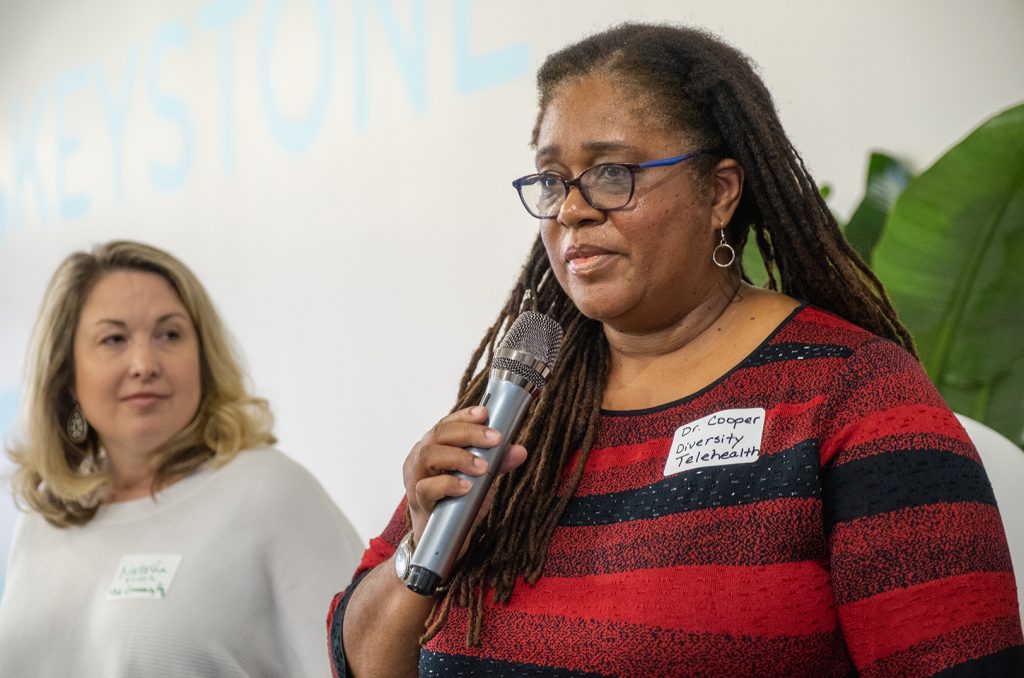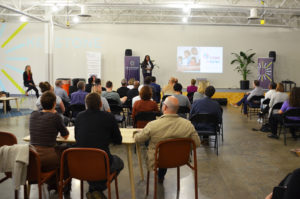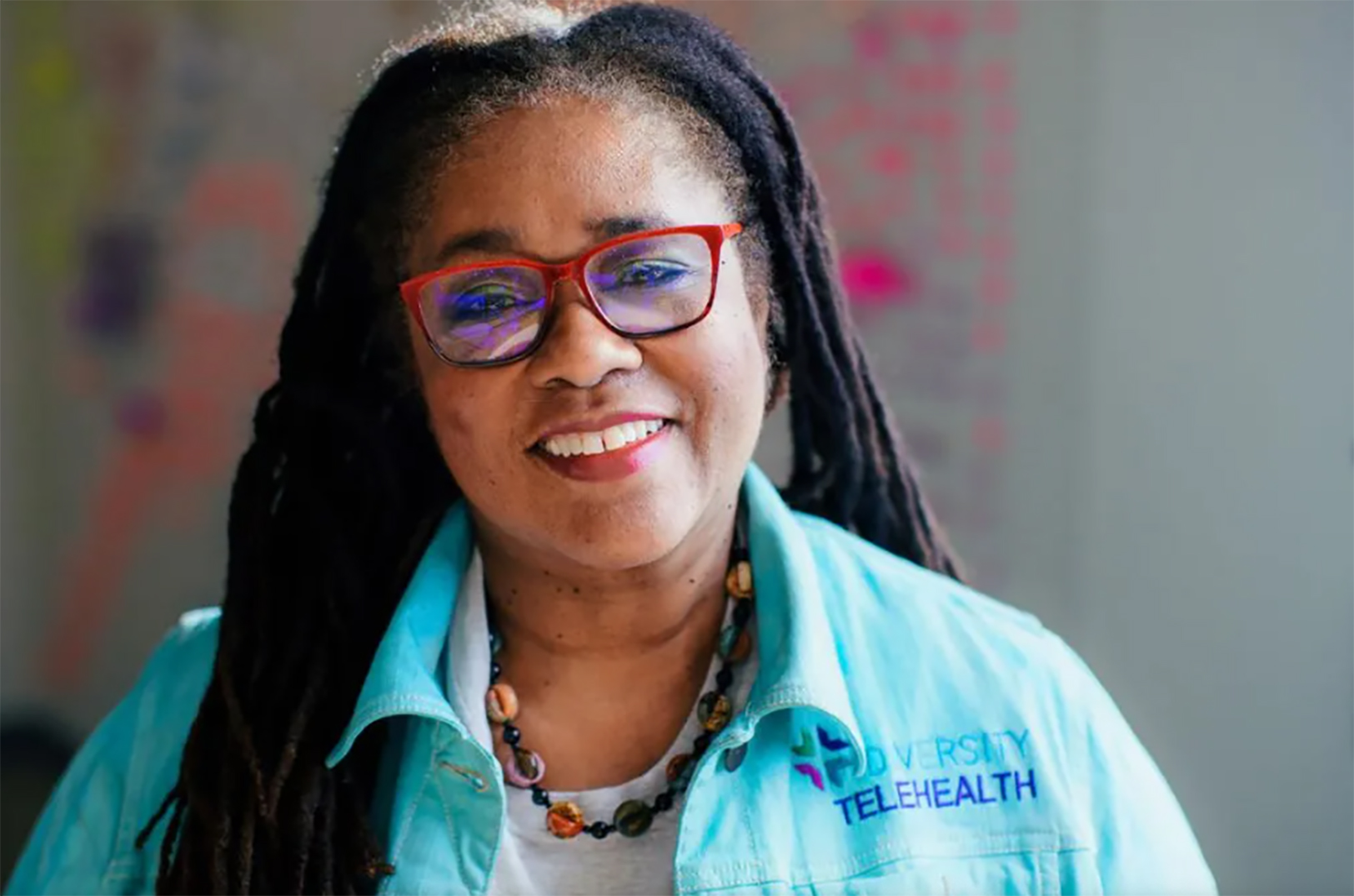Editor’s note: This story was originally published by The Kansas City Beacon, a member of the KC Media Collective, which also includes Startland News, KCUR 89.3, American Public Square, Kansas City PBS/Flatland, and Missouri Business Alert.
Click here to read the original story.
In 2018, Dr. Shelley Cooper observed that a clinic she was working with was experiencing a high rate of no-shows for appointments. That same year, her father died in his sleep. He had medical issues but wasn’t able to book appointments with doctors as quickly as he needed them.
A year later, Cooper channeled grief and frustration into action. She began developing Come On Now, an app designed to reduce the inefficiency and waste of no-shows and canceled appointments in the growing field of telehealth.
“I was thinking of my training in telehealth implementation. What about people who have chronic diseases who need to see the doctors sooner?” Cooper said. “And there are all these no-show empty slots, and the patients aren’t receiving the care they need. And we need to use telehealth more frequently. I put all three together and came up with the product.”
Come On Now, formerly known as SureShow, is currently in beta testing with about 250 users.
Through the app, patients and practitioners receive notifications about upcoming appointments. Patients are able to schedule and adjust appointments according to the scheduling rules of the practitioner’s office, rather than by contacting the office.
“That way, they’re more likely to have that connection with the doctor based on what they need and what the clinic needs,” Cooper said.

Dr. Shelley Cooper, left, accepts the $25,000 prize at the 2022 AltCap Your Biz pitch competition; photo by Nikki Overfelt Chifalu, Startland News
Cooper is one of many entrepreneurs to have launched a venture within the last five years in Kansas City, where entrepreneurship is growing rapidly. Between 2017 and 2021, first-time employers created 86,761 jobs, accounting for 63 percent of all new jobs and about 8 percent of the total employment in Kansas City, according to the KCSourceLink We Create Jobs report.
And as Kansas City startups continue to grow, many founders of color are able to successfully launch their businesses, in spite of prevailing biases within investment.
“In Kansas City, a lot of it would have to do with the strength of the resources that support entrepreneurship, starting businesses and moving businesses forward,” said Michael Carmona, senior director of KCSourceLink, a part of the UMKC Innovation Center that connects entrepreneurs to the available resources in Kansas City that they need to start, grow or accelerate their business.
Organizations like Kansas City GIFT, Digital Sandbox KC, Scale UP KC and the Ewing Marion Kauffman Foundation provide entrepreneurs with resources and funding they need to get their businesses off the ground.
“We have a lot of programming. We’ve seen a lot of grants that have helped get folks started growing and then … you do see job creation as those individuals in their businesses are advancing,” Carmona said.
RELATED: Digital Sandbox KC ‘fuels innovation’ for five emerging tech startups
Startups on the rise
One of the biggest contributing factors to the rise in startups is the COVID-19 pandemic. In April 2020, the national unemployment rate reached its peak of 14.7 percent, the highest rate in the history of data dating back to January 1948, according to the U.S. Bureau of Labor Statistics. In Missouri, unemployment reached its peak of 12.5 percent at the same time.
“As people lost jobs, they looked to entrepreneurship as a workforce opportunity for them, and then furthering those businesses to employ others,” said Carmona.
KCSourceLink estimates that there were 8,197 startup companies in the area in 2021. In that year alone, Kansas City startups created more than 19,000 jobs, an increase of 22 percent from the previous year.
The tech sector in particular saw major growth, with a 92 percent increase in the number of jobs created between 2020 and 2021. KC tech startups created 8,387 jobs over the past five years.
Health care and social assistance saw the second largest amount of job creation in 2021.
With her app sitting at the intersection of health and technology, Cooper believes much of the growth can be attributed to the vast need for improved technology and infrastructure due to inefficient methods and processes within health care.
“There’s so many different ways that the health care industry can be improved,” she said. “And most of those ways are related to technology. Some of them are related to procedures. But for the most part, it’s related to how health care interacts with the patient. How is it implemented on the side of the clinician? And how is the information transferred from the location to the patient?”
Need for diverse funding
As the number of startups in Kansas City and elsewhere continues to grow, initiatives are seeking to rectify demographic inequities in the entrepreneurial space.
While 77 percent of venture capital funds go to companies with white founders, less than 10 percent of VC dollars go to women founders, according to Forbes. The amount of venture capital channeled to Black founders is less than 1 percent.
“One of the challenges for founders of color is funding, access to capital,” said Yinka Faleti, a partner with Ascend Venture Capital, a micro VC firm based in St. Louis.
“It can make a difference between a company going from the next level to a company going out of business if they cannot access capital. And many times, in the case of founders of color, the company was not even able to launch to begin with at all. And so we find that many bright ideas, many brilliant founders or brilliant companies, just die on the vine,” he said.
Ascend rejects many of the prevailing principles and practices of venture capital firms, such as solely investing in companies suggested by colleagues and other major investors.
“Relying on that as your principal deal sourcing leads you to invest in the same type of things,” said Dan Conner, founder and general partner at Ascend. “If you invest like everyone else, you sort of run afoul of the general concept of venture capital, which is looking for contrarian opportunities that are overlooked.”
Investors typically analyze a company’s founder as the first step in their selection process and look for past successes, Conner added.
“And when you think about it, that doesn’t really track with anything steeped in reality,” he said. “At any given time any repeat founder was a first-time founder themselves. So only going for repeat founders means that you will self-select out of those transformational opportunities in the first place. It also introduces a number of biases that, unknowingly, are proliferating in the venture capital industry.” In 2022, Ascend launched an “opportunity fund” to provide $25 million of venture capital funding to entrepreneurs from diverse communities. Applications are open to entrepreneurs in Missouri and throughout the nation.

Dr. Shelley Cooper, Diversity Telehealth, right, speaks during a cohort announcement for the 2022 LaunchKC Social Venture Studio; photo by Estuardo Garcia
‘I just need to move my own business forward’
Shelley Cooper knows all about the challenges. In her journey to receive funding for Come On Now, she has shared the mission of her platform countless times. Despite the paying customers she’s accumulated, she has confronted many setbacks and rejections that she attributes to the startup world’s implicit bias against people of color and women.

Dr. Shelley Cooper, Come On Now, at the demo day for the LaunchKC Social Venture Studio; Startland News photo
“So when I approach different funders, I get the ‘We need to see more traction,’ she said. “And, ‘How many more customers do you have?’ And, ‘We need to see more product market fit.’ And I get that that’s really important, but I’ve spoken with other founders who are not BIPOC, and not women, and they could pretty much have an idea and they’ve got funding falling in their lap.”
So far, Cooper has financed her venture with capital from various sources, including microgrants, pitch competition awards, help from family and friends and a small-business loan. She is waiting to grow her business more before seeking venture capital funding.
According to Crunchbase data, Black entrepreneurs in the U.S. received nearly $1.8 billion in startup and business funding through the first half of 2021. That amounts to only 1.2 percent of the $147 billion invested in all U.S. startups throughout that time.
Cooper said she has been surprised to see some of the funding opportunities secured more easily by white entrepreneurs.
“It’s hard to count how many founders are talking about the funding that they’ve had in terms of millions of dollars, and they didn’t have half of what we had, what they were doing was not saving lives,” she said.
“And so I find it difficult to understand how that happens. But I can’t concentrate on that, I just need to move my own business forward.”
Come On Now has moved its target market from hospitals to federally qualified health centers that serve underserved populations and are funded by the federal government, such as Swope Health.
“That runs along with the mission that the company has of serving the underserved and bringing health care to folks that don’t ordinarily have it,” Cooper said, “and having that continuity of care for the medically fragile patients.”
Mili Mansaray is the housing and labor reporter at The Kansas City Beacon.









































